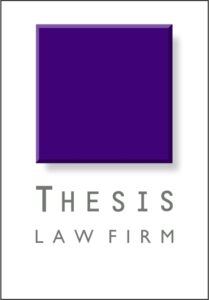 Interview with: Kloy Tsiaga, Managing Partner
Interview with: Kloy Tsiaga, Managing Partner

THESIS LAW FIRM
Managing Partner Kloy Tsiaga explains how the firm adds value to the clients’ business.
1) What do you see as the main points that differentiate Thesis Law Firm from your competitors?
Our long-term client relationships and the consistent quality of the legal solutions we provide are the bedrock upon which our practice stands. We respond to client requests promptly, resolve complex issues with tailor-made solutions, having dealt with transactions involving many areas of law and different jurisdictions, and are able to meet tight deadlines.
We believe it is of vital importance to take into account the commercial activities and plans of the clients, even issues that may not be directly related to a transaction, and be proactive in order to provide advice that best serves their interests.
We are able to supply our clients who are active in different countries with time- and cost-effective solutions in part thanks to our network of European and international lawyers.
Adept at advising both individuals and businesses, we advise on a wide range of legal matters from the traditional: corporate, commercial, capital markets, public procurement, property, hospitality, IP and tax law, to more contemporary, sophisticated fields, such as NPLs, e-commerce, personal data protection, digital law.
We also regularly advise on Greek and cross-border issues regarding international assets and business interests, all provided in several languages, including Greek, English, French, Russian and Spanish.
2) Which practices do you see growing in the next 12 months? What are the drivers behind that?
The expansion of artificial intelligence in business and industry will likely bring a rapid rate of change in information technology law, including all modern technologies and the internet.
There will be shifts in environmental law, as climate change continues to feed the demand for sustainable solutions.
The recent evolution in work models, especially after Covid, including remote work and burnout, will most likely lead to further adaptations in labour laws.
Cybersecurity and data protection law, health and telemedicine law, will also be affected by both the Covid pandemic itself and the remote medical assistance which it entailed.
If any of these practices do not necessarily change quickly over the next 12 months, they are still certain to grow in the years to come.
3) What’s the main change you’ve made in the firm that will benefit clients?
In order to diversify the talents our firm encompasses, we have implemented a new mode of operation in which, no matter their specific field of practice, our lawyers actively participate in cases involving areas of law outside their specialty.
This has been a highly valuable approach, as it allows for a more comprehensive understanding of legal issues and an exchange of opinions that better serves clients’ needs.
In addition, the ongoing education of our staff is a priority, in order to keep everyone current with the latest legal developments.
4) Is technology changing the way you interact with your clients, and the services you can provide them?
As many of our clients are foreign individuals and entities, the ability to hold meetings on conferencing platforms, the digital signature of documents, the digital transformation of the public sector in many countries, and the general use of technology facilitates international transactions, eliminating distance constraints with those clients, as well as saving time by simplifying the provision of services to all of our clients.
5) Can you give us a practical example of how you have helped a client to add value to their business?
An example is a hospitality/entertainment project that was implemented in Greece by foreign clients of ours. Within a short period of time, it became one of the most famous venues in the world. In order to provide advice which could potentially add value to their project, we first needed to understand the business and its operations.
We represented the clients in negotiating deals, drafting contracts and other legal documents, and introduced our clients to trusted professionals who could handle accounting, technical issues, etc.
We provided employee training on compliance-related topics, helping them better understand the requirements and how to avoid potential risks. We also developed procedures so that employees are aware of, and comply with, the relevant laws and regulations.
In addition, we provided our clients with feedback on various topics, helping ensure that all decisions could be made with a full understanding of their implications.
6) Are clients looking for stability and strategic direction from their law firms – where do you see the firm in three years’ time?
We believe that clients are seeking out firms who are responsive, understand their background, activities and profile, have a comprehensive approach to legal issues, take into account all related matters – such as tax implications, financing conditions, etc. – and can give them prompt, concrete advice and direction.
For this reason, we maintain long-standing relations with our clients, who most often prefer we deal with all of their legal cases and transactions, as well as coordinating any other consultants involved (e.g. technical, financial, etc.).
Having built a strong culture at our firm along these lines, filled with people we trust, our goal is to grow the business, exploring new markets while providing quality legal representation to our clients and building a team that can support that growth.
